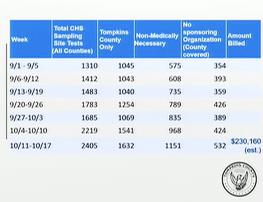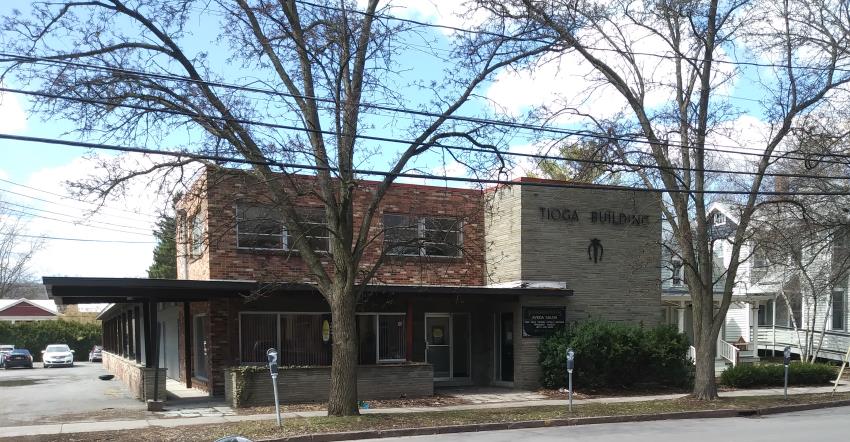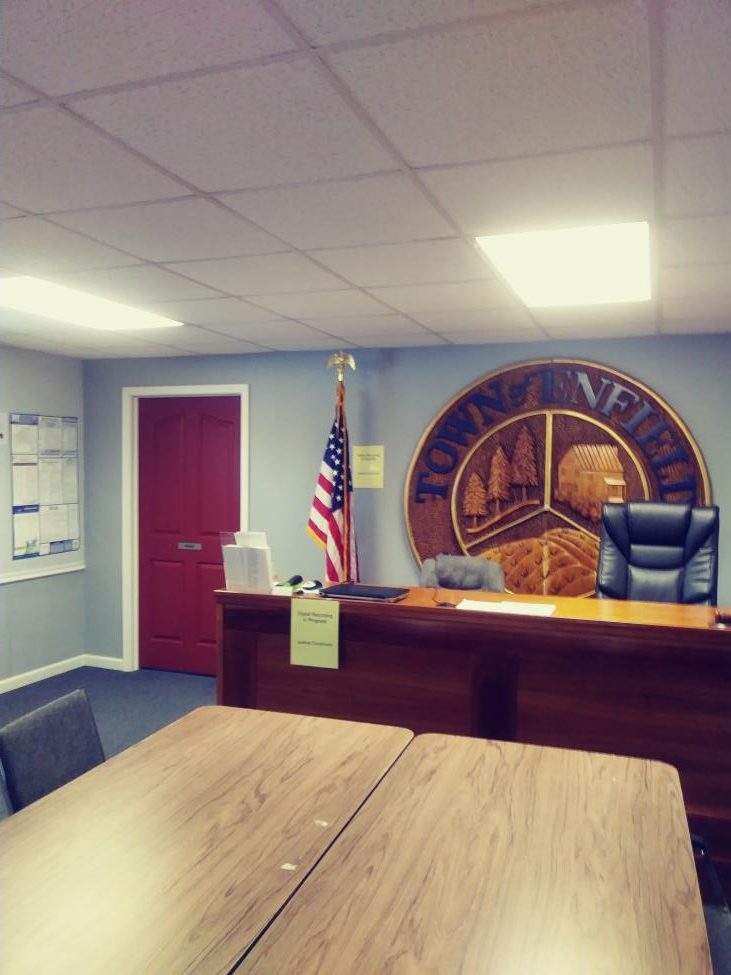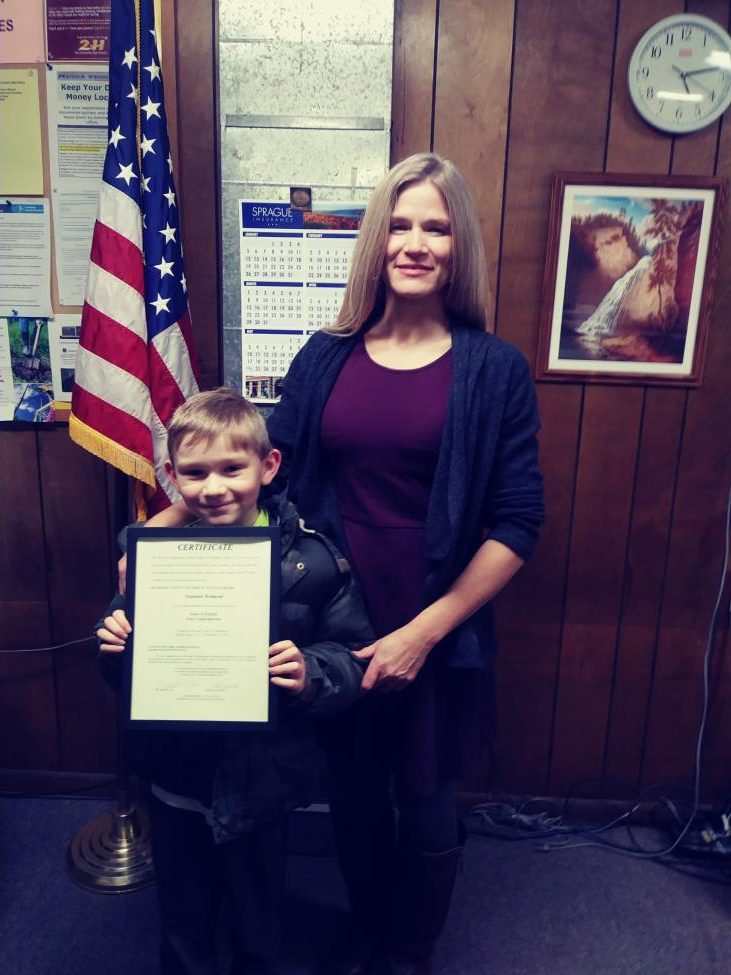Tompkins Legislators advance 2021 Budget to Public Hearing
by Robert Lynch, October 30, 2020
With the heavy lifting done—accomplished by lawmakers through a string of prior meetings—the Tompkins County Legislature Thursday (Oct. 29th) unanimously approved a $190 Million Preliminary Budget and sent it on for the legally-required Public Hearing November 10th.
What might have been a perfunctory, ten-minute zoom yawner was stretched to three-quarters of an hour only because of one last-minute addition, an otherwise financially-insignificant $20,000 add-on to fund for another year the Early Intervention Homelessness Prevention Program, a legal advocacy service.
The program “intervenes before someone ends up in eviction court; before they end up with all their goods on the sidewalk,” explained Dryden legislator Martha Robertson, the Legislature’s Budget Committee Chair.
During the COVID-19 pandemic, Governor Cuomo has suspended home evictions statewide. However, program advocates fear those evictions will resume, and perhaps ramp up, as soon as Cuomo lifts the moratorium.
Only legislator Mike Lane (D-Dryden) opposed the last-minute increase. County officials assured lawmakers the revision would not affect tax levies or tax rates hammered out at a Budget Committee session two nights earlier. (See previously-posted story.)
As it stands, the 2021 Tompkins County Budget would levy property taxes of just over $52 Million, an increase of 2.21 per cent from the current year. But because county-wide property assessments have increased, the tax rate on those assessments would fall slightly, down 1.61 per cent.
In recent years, the County’s budget hearings have drawn minimal attendance and resulted in few, if any, subsequent changes. If history repeats itself, the 2021 County Budget stands on target for final adoption Tuesday, November 17th.
###
Tompkins lawmakers reject zero-tax hike budget option; adopt half-way compromise
by Robert Lynch, October 28, 2020

“We have been overtaxing our county residents…. I mean it as simple math.”
With those words, Danby legislator Dan Klein unsuccessfully urged his fellow members of the Tompkins County Legislature Tuesday to cut to zero next year’s budgeted increase in the county’s tax levy and to tap the County’s accumulated fund balance—its savings account, of sorts—to accomplish it.
Klein failed in his effort. Instead, the Legislature’s Expanded Budget Committee, its membership comprising the full Legislature, adopted a compromise which would only draw down the multi-Million Dollar balance enough so to allow the committee to cut the initially proposed five per cent levy increase by about half.
Ending a nearly three-hour meeting, one in which you often needed a scorecard to keep track of the progress, the committee approved and advanced to the full Legislature a $190 Million spending plan which would increase the tax levy by 2.21 per cent, yet actually cut individual homeowners’ tax bills providing their assessments have not increased over the year.
“The reason you have a fund balance is so you can spend it in an emergency. We are in an emergency,” Klein said in prepared remarks he passionately read aloud before the committee. “Some people refer to a fund balance as a rainy day fund. Guess what? It’s pouring outside.”
Since joining the Legislature seven years ago, Klein said he’s seen the County’s fund balance grow 300 per cent—from $16 Million to $46 Million—while annual expenses have risen by only 30 per cent. Klein sought to draw $2.8 Million from the balance, the fund already reduced somewhat by the COVID pandemic, to keep the tax levy unchanged.
“Can we think of lots of ways to use that money? Sure, of course,” Klein said, speaking of the fund balance. “But here’s one. Let’s give some back.”
But others thought Klein’s pronouncement oversimplified the problem. First, the County’s operating losses resulting from the COVID-19 pandemic will drain an estimated $4.5 Million from the fund balance this year alone. Combined with investments for capital improvements, Klein’s proposed $2.8 Million transfer would have cut the balance to about $32 Million. And legislators conceded uncertainty about the financial road ahead.
“I went to the mall the other day. Holy crap, half of it is empty,” exclaimed Deborah Dawson, a Legislature budget hawk. “What affect that’s going to have on our tax base, I don’t know.”
Dawson’s concerns aside, the committee embraced County Administrator Jason Molino’s new, more optimistic sales tax projections, estimates based on newly-released summertime data. Molino now forecasts a somewhat V-shaped sales tax bounce-back for 2021 and beyond. Whereas estimated sales tax revenues for this year will plummet more than 11 per cent from last year’s collections, the Administrator now projects a 1.5 per cent increase next year and average annual 3.4 per cent increases through 2024.
With cost-conscious legislators wary of Klein’s $2.8 Million draw-down, members first tried to cut it to about $2.3 Million by adding into the budget Molino’s more optimistic sales tax forecast. After that effort failed with a tied vote, legislators defeated Klein’s original motion by a vote of six to eight.

However, Ithaca legislator and State Assembly candidate Anna Kelles then moved her compromise, one she described as a “pretty stellar, quite complicated and multi-pronged solution of addressing a lot of different needs.” The Kelles compromise again plugged in Molino’s $555,000 in newly hoped-for sales tax money. It pulled just $1.1 Million from the fund balance. And it lowered the original five per cent levy increase to just 2.21 per cent. Kelles’ amendment passed unanimously.
Still not satisfied, Klein then sought to eliminate Molino’s earlier proposed $1 Million increase in the contingent fund, a catch-all account fattened by the Administrator, in part, to deal with uncertainties in state aid. The committee rejected the change with only Klein supporting it.
Those opposing Klein’s more radical zero-growth tax levy gave several reasons. Some cited future uncertainty. “From everything we hear, 2021 will be ever harder on folks than 2021,” warned Legislature Chair Leslyn McBean-Clairborne.
“We’ve got to turn this boat around. If we don’t, next year is going to be more difficult,” echoed Lansing’s Mike Sigler, viewing as acceptable a modest levy increase.
Still others heeded Molino’s warning that cutting the increase to zero in 2021 could lead to tax bill sticker shock in 2022, with levy increases then of seven to ten per cent, depending on the pandemic’s lingering effects.
“When we’re considering seven, eight or nine or ten, or (alternately) maybe five per cent plus 50 layoffs, they (the taxpayers) are not going to remember that they didn’t get a tax increase this year,” remarked Budget Committee Chair Martha Robertson.
Robertson’s Dryden colleague, Mike Lane, also suggested the County might need the larger fund balance in future years to bail out the financially-ailing TC3.
Both of Enfield’s legislators, Anne Koreman and David McKenna, rejected Klein’s proposed $2.8 Million fund balance draw-down, yet supported the Kelles compromise.
Though the fund balance stood at a lofty high of $46 Million at the end of 2019—fattened by prior year’s surpluses—it’s taken a hit this year. Following Tuesday’s action, the balance will likely stand next year at $34 Million, about 18 per cent of annual revenue.
Almost forgotten amidst Tuesday’s larger debate, the Budget Committee briefly discussed, and then unanimously endorsed, the hot topic at its previous meeting, namely the creation of a $110,000 per year Chief Sustainability Officer within County Administration.
As adopted by the committee, the proposed County Budget would impose a tax levy of just over $52 Million and carry a tax rate of $6.21 per thousand of assessed valuation. Because countywide property values have increased, the actual tax rate would fall next year by 1.61 per cent. For the median-priced home, now valued at a higher $200,000, the levy hike would raise the tax bill by nearly $43. County officials noted it’s the seventh straight year that the County’s tax rate will fall.
“The benefit of this is going to go largely to people who don’t really need it,” complained Dawson. “How many of our poorest and most marginalized citizens are living in a $200,000 house?”
The County Legislature will likely elevate the Expanded Budget Committee’s proposal to preliminary budget status Thursday, setting the stage for a Public Hearing and a final vote in November.
###
County urges self-reliance should quarantines sideline snowplows
by Robert Lynch, October 22, 2020
No pun intended. But maybe you could call it the “perfect storm.”

Ulysses Supervisor Nancy Zahler raised the question as a hypothetical to Tompkins County Administrator Jason Molino Thursday (Oct. 22nd) as he concluded his 40-minute biweekly conference call with local municipal leaders discussing local responses to COVID-19.
What if a Town’s Highway workforce were quarantined because someone on it contracted the coronavirus, asked Zahler. How would the snow get plowed? And if that happened, could the County Highway Department provide a backup?
Molino’s response was not what Zahler likely wanted to hear.
“Tompkins County does not have the resources,” the County Administrator replied. “To simply say we could cover your needs, I’d say ‘No,’ we have to prioritize.”
Molino explained the County Highway Department has its own roads to maintain. Those roads have to be the “priority basis.”
The Administrator reminded Zahler that as “essential workers,” Town highway employees can still work while on quarantine, so long as they don’t exhibit COVID-like symptoms. While those workers must
during their off-hours quarantine in home isolation for 14 days, they can still report to work and comply with the law.
While such a confluence of bad weather and COVID quarantine remains merely a hypothetical and stands far from certain, municipal officials must also consider that worst-case scenario as winter approaches.
And the impact could be especially severe in Enfield, where the Town Board last month trimmed its 2021 Highway Budget by cutting one of its five, full-time positions, thereby reducing 20 per cent of the wintertime workforce.
In opposing the reduction, Highway Superintendent Barry “Buddy” Rollins had warned the Board that its cut would leave his department short-handed in inclement weather and in his opinion would delay his ability to clear snow from all Town roads in a timely manner.
However, one can also understand Molino’s dilemma. To reduce next year’ County Budget in response to the pandemic, Molino cut an equivalent 47 full-time positions from the County workforce, a few of those jobs in the Highway Department. Yet a close examination of the proposed 2021 Highway Budget indicates that most of the County’s cuts were made in technical and clerical positions, not with road crews.
Bottom line: For Enfield, Ulysses and any Tompkins County town, best hope for a mild winter; and also that everyone takes steps to keep the coronavirus at bay.
###

Local No-Symptom Testing program likely to extend as COVID cases spike
by Robert Lynch, October 21, 2020
In late-August, ten weeks seemed like an eternity as Tompkins County lawmakers set aside taxpayer dollars to fund free, local coronavirus testing available to those without symptoms.
But now, with the county’s COVID-19 cases the highest they’ve been since the pandemic began, that ten-week period’s ending date—about a week after Election Day—looms large and feels too close for many. As a result, County leaders indicated Tuesday they’ll likely extend the program beyond its original termination date, and also provide it more money.
“We will do whatever it is that we need to do to protect our community because this thing is so unknown, it’s so novel, so dangerous to certain populations more than others,” Chair Leslyn McBean-Clairborne assured her Tompkins County Legislature Tuesday, her comments made after Health Officials briefed legislators on their current COVID-fighting efforts.
“We need to do what we can do. We will not be stingy,” McBean-Clairborne declared.
Two months ago, the County Legislature, after much debate and with some reluctance, earmarked $300,000 in contingency funds to underwrite the local share of a 10-week trial program to reimburse Cayuga Medical Center for the cost of providing free coronavirus tests to any County resident whose insurance or employer would not pick up the tab. The program began September first. So by the calendar, it would expire November 10th.
Yet, during that time, local coronavirus cases have risen. Health Department statistics as of Tuesday reported as many as 62 local active cases. Eight people are now hospitalized with COVID, whereas none were when the program began. Tompkins County recorded its first local COVID-related death October 12th.
Officials suggested Tuesday that the ten-week deadline could be stretched a bit later without an additional infusion of public money. The increasingly-popular testing program, which started with 354 weekly participants in early-September, reported as many as 532 during the period of October 11-17. An estimated $230,000 has been billed to the County to date. But of that amount, a federal program should pay three-quarters of the cost. No one talks anymore about Albany contributing anything.
“I think we’re a little under where we estimated,” County Administrator Jason Molino told the Legislature as to the outlay. So looking at the deadline, “We might have a week to two weeks leeway there.” But the Administrator made clear he’d likely return to the Legislature’s committees soon seeking additional money, probably also drawn from the contingency account.
“I think this has proven to be a valuable resource to the community,” Molino said of the program. For one thing, he explained, the testing provides an easy way for potentially exposed public school students to return to the classroom.
Meanwhile, Molino and County Public Health Director Frank Kruppa warned the Legislature that Tompkins County’s many months of basking in an oasis apart from the pandemic’s worst impacts may soon be over.

“Right now we have the most active cases that we’ve had throughout this whole event, more so than in March and April at any point in time,” Molino told the Legislature.
“We are now in community spread,” Kruppa added, noting that a majority of local positive cases now arise from unidentified sources, not from a particular group or individual.
The Director reported that in September, a full 71 per cent of infected individuals knew the source of their contagion, often from those college “clusters.” But so far in October, 57 per cent of those infected cannot pinpoint their infection’s source.
Nonetheless, when questioned by Ulysses-Enfield legislator Anne Koreman, Kruppa said he’s concluded most unidentified infections likely originate from those “commuting in and out of the county,” not from undiagnosed asymptomatics living locally. He stated that of those tested, the vast majority have reported having COVID symptoms either at the time of their test or slightly beforehand.
The community’s disease-fighting remedies, said Molino, remain the same as before, namely “a public education approach and being vigilant.”
None of those addressing the Legislature Tuesday speculated as to further government crackdowns, such as banning travel to COVID hot-spots within the state. Deputy County Administrator Amie Hendrix doubted authorities would be “stopping people at the borders” since, she said, “the region is where it is” and many must commute to work from outside the county.
Molino did report that Governor Cuomo has warned localities that their refusal to enforce his masking and mass gathering mandates could lead to their loss of state aid. But the Administrator discounted the prospect that Cuomo’s warning would impact the City of Ithaca, whose police have declined to enforce masking and gathering restrictions.
On another point, Kruppa reported that his department has progressed toward establishing a downtown Ithaca testing site to complement Cayuga Health’s existing operation at the Lansing mall. Kruppa declined to identify the downtown site’s location or name a start-up date. But he predicted it could be in operation by the time the County Legislature next convenes, November fifth. Kruppa cautioned the downtown site would be reserved for those without transportation to the mall, keeping the mall as the county’s primary testing location.
Legislator Anna Kelles said she’d been tested the prior weekend as she’d visited a store where a worker had contracted COVID-19.
“It was seamless,” Kelles reported of her test. I was “in and out” in ten minutes. True, she said, it was a “very uncomfortable experience, having my brains tickled by a swab.” But the test was “relatively painless,” Kelles said. Staff even “gave our puppy a biscuit.”
###
Tompkins lawmakers endorse rural broadband study; delay decision on Climate Czar
by Robert Lynch, October 20, 2020
After exhaustively discussing, and then ultimately delaying action on creation of what can best be described as a Climate Change Czar, Tompkins County legislators late Monday (Oct. 19th) quickly and routinely approved budgeting for a study, endorsed by the Enfield Town Board last week, which could extend broadband Internet service to underserved rural areas.

With less than ten minutes of discussion and with no objections raised, the County Legislature’s Expanded Budget Committee, its members comprising the entire Legislature, unanimously endorsed placing within the 2021 County Budget the nearly $80,000 study, an increasing proportion of its cost to be borne by local municipalities, including Enfield.
“We have a crisis with broadband,” said Legislator Anna Kelles, the Legislature’s driving force behind the intermunicipal broadband initiative. “We have a system in place where we grant taxpayer money that goes to provide companies that build the physical system and then provide service through that system. So they determine when things get built and the quality of the service that gets built.”
Kelles would prefer municipalities, themselves, to be in the driver’s seat. And should the recommended study prove it’s feasible, a non-profit corporation affiliated with those municipalities would own the wires to many homes, lease access to service providers, and thereby hold more power over quality and price.
On October 14th, the Enfield Town Board endorsed the broadband study and also pledged $5,000 in Town funds toward its completion. By the time of Monday’s Budget Committee vote, three other towns, Newfield, Caroline and Danby, had done likewise. As the Budget Committee was meeting, the Ithaca Town Board was meeting as well, during which it unanimously offered its support. Kelles predicted that the Town of Lansing would add its endorsement Tuesday, and that Ulysses would follow suit. She said the Trumansburg Village is considering joining in. Kelles will reach out to “several school districts” seeking their endorsement.
The municipal contributions could defray nearly half of the County’s earlier-estimated $79,000 outlay. For perhaps that reason, City of Ithaca legislators—whose well-served districts would gain little from the study—voiced no objections.
The broadband study’s Over Target Request, essentially a budget add-on, will not become final until the Legislature adopts the 2021 County Budget in November. But Monday’s committee action effectively makes its inclusion a certainty.
Not so simple, however, was the Budget Committee’s consideration of adding a yearly $110,000 appropriation for what’s been renamed a “Chief Sustainability Officer,” formerly known as a “Climate Action Coordinator.” The newly-created position would, in the words of Legislator Deborah Dawson, assume responsibility for implementing a “county energy strategy,” one whose goals would be “net-zero emissions from county facilities.” The three-year appointee would, said Dawson, oversee “managing and monitoring current energy use working with county employees to reduce greenhouse gas emissions.”
But while no legislator voiced opposition to the oversight position, some expressed concern over last-minute changes sent to lawmakers’ inboxes only 45 minutes before meeting time. Labeled as “tweaks,” by Dawson, the changes appeared to some as more substantive. They’d move the renamed position from the Planning Department to County Administration and leave its responsibilities only loosely-defined.
“I have a real question of whether this has been put together so that we’re comfortable with it,” said Dryden’s Mike Lane, who unsuccessfully moved to divert the appropriation to a contingency account to enable officials more time to write a better job description.
One can draw strong parallels between the revised Sustainability Officer’s job and that of another recently-created Administration post, albeit one with much different responsibilities. One year ago, the Legislature budgeted a Chief Equity and Diversity Officer, a job only recently filled. Lawmakers charged the Diversity Officer with rooting out systemic racism in Tompkins County policies.
The Expanded Budget Committee will likely consider adding the Sustainability Officer to the County Budget and its workforce roster at its next meeting, October 27th.
The score of budget changes approved by the committee Monday added more than a quarter Million dollars to Tompkins County’s proposed nearly $54 Million tax levy, boosting that levy’s increase by over a half a per cent from earlier budget projections. As it now stands, the levy would rise 5.49 per cent over last year, well in excess of the state’s tax cap.
###
Enfield Board backs County broadband initiative with local funding
by Robert Lynch, October 15, 2020
Arial lives near Enfield and works from home. So does his partner. His two kids study there. They’re watching instructional videos while the parents are on zoom.

“We can barely do it,” Arial told the Enfield Town Board Wednesday night, faulting his self-described “exorbitantly expensive” and “very slow speed” Internet connection. Arial begged the Town Board for help.
“Anything that furthers greater access to unserved or underserved areas of Tompkins County is something we really should be looking into,” he pleaded.
Later that night, October 14th, the Town Board gave Arial and neighbors like him a glimmer of hope.
By unanimous vote, Enfield’s resignation-diminished, three-member Town Board endorsed a Tompkins County Legislator’s plan to fund a study whose purpose would “identify a possible path forward for a county-wide buildout of… fiber optic cable in Tompkins County.”
Perhaps this is among those rarest of stories better told in 600 words than in six thousand. Brevity edits away the “geek-speak.” Told otherwise, it could leave one lost in the weeds. (What is “middle-mile, dark fiber” anyway? Don’t ask.)
Put succinctly, the Enfield Board’s action supports County Legislator Anna Kelles’ initiative to tag onto next year’s Tompkins County Budget an $80,000 appropriation, a so-called “Over Target Request,” to fund the five-part study whose outcome could lead Tompkins County and/or its townships to extend municipally-run broadband service to fill-in rural dead-spots and also compete with pricey commercial providers.
Though initially struck from Wednesday’s Resolution, the Enfield Board added back in a commitment to spend $5,000 in Town funds to defray the County’s cost, moneys to be paid once the requested contract is signed.
The Towns of Caroline and Danby have already promised similar subsidies, according to Kelles. Lansing may soon chip in its share as well.
“Having a municipally-owned middle- and last-mile infrastructure—Sorry, geek-speak—could change the game of prioritizing getting out to the most rural areas,” Kelles told the Tompkins County Council of Governments (TCCOG), an intermunicipal study group, September 25th. TCCOG’s became the meeting where the Ithaca-based County Legislator and now State Assembly candidate provided the political shove that gave her funding proposal its current momentum.
“If the County does do a study, then it’s up to all of us to figure out what we want to do with it,” Kelles told the group.
Closely partnering in the proposed County initiative is the Southern Tier Network, (STN) an intermunicipal non-profit group already serving communities from Corning to Binghamton. STN would provide the crucial community-to-community fiber optic link, much like a superhighway. STN’s Executive Director told TCCOG that STN has already strung cable—as yet, unused—from Spencer north to Ithaca. It’s designing another leg to run the entire length of NY 327, including through Enfield Center, then west from Miller’s Corners to Watkins Glen. Grant money already pledged would fund the Enfield leg.
“It’s time to cut to the chase, shall we say,” remarked Councilperson Virginia Bryant, in endorsing the $5,000 Enfield contribution prior to her vote. She said her community has been coping with substandard Internet for years and that with her approval, “We’ll have a lot of happy Enfielders who are in the ‘hollers,’ who’ve been struggling during COIVID,” home schooling and working from home.
Bryant’s colleague, Councilperson Robert Lynch (this writer) acknowledged the strain of this year’s tight Town finances and budgetary frugality, but joined with his support.
“This is spending money, but it’s for the good of the community,” Lynch said. “We’re spending it with the intent that we are going to get better broadband service for a heck of a lot of Enfielders that don’t have it right now.”
The Tompkins County Legislature could begin deciding Over Target Requests, including Kelles,’ Monday, October 19th. A final budget vote would come in November.
###
Enfield Board sets November meeting to fill Mehaffey vacancy
by Robert Lynch, October 14, 2020
In a meeting marked with collegiality, not rancor, the Enfield Town Board Wednesday (October 14th) agreed to move quickly—but not too quickly—to fill the Board vacancy created by Councilperson Mimi Mehaffey’s sudden resignation October 5th.

In adopting procedures that members said would provide maximum transparency, the now three-member Board set its next Regular Meeting, November 11th, as the target date for filling the Mehaffey vacancy. Before that meeting, members will solicit interested candidates through both the Enfield Republican and Democratic Parties, the Town’s website, and by other means.
“[W]hile in a more perfect transition, filling this Councilperson vacancy might default to the voters,” Councilperson Robert Lynch (this writer) wrote to his Board colleagues in an email the day after Mehaffey resigned, “I believe it cannot in this instance,”
“If we fill the vacancy properly, I hope the residents, the voters will understand,” Lynch wrote.
Urgency is dictated by reality, all on the Town Board agreed Wednesday. With Beth McGee having resigned as Town Supervisor September 30th, and then Mehaffey departing less than a week thereafter, the Enfield Board now finds itself dangerously short-handed. State law requires three affirmative votes to approve any issue on the five-member Board. The Board now has no votes to spare.
Lynch noted that if any member became ill, was called up for jury duty, or left town to deal with a family emergency, the remaining members would find themselves powerless to act. Furthermore, he said, the current requirement for unanimity on every issue leaves no room for member disagreement; something he said was both inherent in and healthy for democracy.
Though the Board did not cast its timetable in stone, members’ unofficial consensus called for candidates to come forward by a Tuesday, October 27th special meeting, already scheduled to discuss the taxing arrangements for the newly-proposed Norbut solar farm on Applegate Road. Candidates might be interviewed at the meeting and perhaps questioned by the public as well. Board members would then select their preferred candidate November 11th.
Because the Board would continue short-staffed through that vote, all three continuing members, namely Lynch, Acting Supervisor Stephanie Redmond, and Councilperson Virginia Bryant, would need to concur on the choice.
In an effort to apply what he termed a bit of “affirmative action” to the selection process, Lynch suggested that the Town reach out to the Tompkins County Human Rights Commission and perhaps similar organizations to solicit candidates from what he termed “under-represented” racial and/or ethnic minorities. To qualify, all candidates would need to be Enfield registered voters.
Already one such minority member, James Ricks of Rothermich Road, who called into Wednesday’s meeting and spoke under privilege of the floor, and who identified himself as African-American, said he might be interested in filling the vacancy.
Any candidate the Town Board chose to succeed Mehaffey would serve just 14 months. He or she would need to seek election in November 2021 to retain the seat into a new four-year term. Had Mehaffey not resigned, her term would have come up for reelection then, anyway.
As with the Councilperson’s position, the Town Board could similarly fill Supervisor McGee’s vacancy, either selecting an outsider or one of its own for the appointment. Councilperson Redmond has actively sought the elevation, but Lynch has resisted her appointment, at least for the time being, citing a citizen petition that urged any new Supervisor be chosen only by voters, not by the Board.
The current stalemate could leave the Supervisor’s post unfilled for months, perhaps until January 2022. Yet all three remaining on the Board acknowledged the Mehaffey seat, its role confined to Town legislative matters, could not wait until next year’s election.
Lynch predicted that should the Mehaffey seat be filled through his recommended procedure, which the Board accepted, “not only would we find a final choice more to our own liking; our constituents would not feel they’ve been cheated, shut out of the process; they’d feel they’d had a voice in the selection as though they’d voted.”
###

From Corn and Hay to High Voltage
Plans unveiled for 20 Megawatt Applegate Road Solar Farm
by Robert Lynch, October 8, 2020
One month ago, Applegate Road landowner Barbara Masser was coy.
“If I had a crystal ball, I would tell you what’s going in there,” Masser told the Enfield Planning Board, responding to rumors that her family’s farm fields east of Applegate Road, across from Johnny’s Wholesale, might soon sprout solar panels.
Well, Barbara must have bought her fortune-teller’s sphere since then.
Wednesday night (October 7th), Enfield’s same town planners had before them a Rochester developer’s preliminary plans for a nearly $27 Million solar farm on that same field. It would be Enfield’s most ambitious solar energy project to date.
“I like the looks of this project so far,” said Planning Board member Henry Hansteen, reacting to Norbut Solar’s proposal to construct four separate quadrants of panels several hundred feet back from the Applegate roadline, the array consuming part of the agricultural land that exists there now, and also likely occupying some of the woods that lies to the east.
Dan Huntington, Norbut’s Business Development Manager, predicted that if approvals come quickly, as well as the panels, his company’s project could be under construction by next May.
Norbut intends to purchase the entire 250-acre tract from Masser and her partners. It would hold the land long-term, and then, much like a lease, allow the firm’s “development partners” to harvest the energy and sell it into the grid.
By purchasing and holding the land, Huntington said, Norbut has “a unique capability to address any concerns” the Town or local residents have “that might impact liability.”
Reaction from both Enfield planners and Town Board members present Wednesday was positive. They raised more than an hour’s worth of questions, but aired few, if any, complaints.
Both Acting Supervisor Stephanie Redmond and Councilperson Robert Lynch (this writer)—constituting two-thirds of the now short-staffed Enfield Town Board—attended Wednesday’s meeting. Redmond suggested the Town Board would, itself, invite Huntington to discuss the project either at the Board’s November meeting or at an earlier, special session.
For reasons having largely to do with energy regulation by utilities, the Norbut project would be split into four separate systems, each generating a maximum five Megawatts of electricity. Though each quadrant would stand on its own tax parcel, the systems would be configured in a square, with their control point at the center, and a driveway connecting that junction to Applegate Road.
The panels’ road setbacks, much greater than the Town’s 2019 Solar Law mandates, were, said Huntington, designed to minimize glare, including to pilots using the Neno Airport, situated across Applegate Road to the west. The setbacks would also maximize use of the farmland between the array and Applegate, land Huntington hinted might eventually be developed, but for now would be kept agricultural.
The placement utilizes the site “as efficiently as possible,” Huntington said. It also “preserves the surrounding area.”
Last year’s Enfield Solar law mandates that solar panels occupy no more than 60 per cent of a developer’s property. Since each of the quadrants would occupy a separate parcel, Huntington acknowledged a town variance might become necessary. But the system, at most, would occupy less than half of the 250 acres to be purchased.
When the Norbut project was first rumored in early-August, Planning Board Chair Dan Walker cautioned any developer might need to beef-up the NYSEG line heading down Mecklenburg Road, since existing Enfield solar farms may have already taxed the line to capacity.
Speaking to the Board Wednesday, Huntington dismissed Walker’s earlier concern, saying the hefty NYSEG 34 kV trunk could handle the load from his farm as well as from the others, though it would be “maxed out” thereafter. The line’s adequacy would prevent the need to cut foliage, set new poles, and conceivably disrupt Mecklenburg Road homeowners’ yards.
Foliage removal at the site, however, might prove a different matter. Preliminary site sketches show the easternmost panels covering some existing woods. Huntington could not say Wednesday how much forest might be removed, though he said developers would prefer to clear brushy acreage, rather than older stands of taller trees.
Many questions posed concerned the tax consequences of the project. Taxation of solar projects can follow two paths; either by means of a Payment in Lieu of Taxes (PILOT) Agreement through the County’s Industrial Development Agency (IDA), or through one-on-one negotiations with the Town, and County, and the Ithaca City School District (ICSD).
Though tax consequences from the project remain unsettled—as does the taxation alternative the Town might prefer—figures offered Wednesday suggested a PILOT Agreement could bring the Town perhaps $25,000 in annual revenues. An additional “Host Community Agreement,” a sort-of supplemental gift from Norbut to the Town—could generate for Enfield’s coffers additional money.
Perhaps by law or by practice, PILOT Agreements tend disproportionately to benefit school districts. Town officials were told the ICSD would likely receive a full 66 per cent of PILOT revenues; the Town of Enfield just over 28 per cent.
It’s expected the Enfield Planning Board will take up site plan review for the Norbut project at its next meeting November 4th.
And so much for “Buy American.” Huntington conceded his firm will need to go overseas, likely to China, to purchase the apparatus. There’s “not a market in the U.S” to supply the panels, he said.
###
Tompkins Legislative Committee hints at “other options” for new office building
by Robert Lynch, October 8, 2020
It could be a roadmap to Tompkins County Government’s best-kept secret… or maybe just an instance of bureaucratic foot-dragging. But at long last, for only the third time in a full 14 months, a committee of the Tompkins County Legislature met Thursday (October 8th) to discuss the County’s plans for its new, ambitious $20 Million office building and renovation project.

Month after month, since August 2019, the Legislature’s Downtown Facilities Committee has scheduled—and then routinely, almost humorously, canceled—meetings to consider redevelopment of a $1.8 Million parcel the County bought last year at 408-414 North Tioga Street. The only meetings held last winter dealt primarily with routine parking matters.
The Tioga lot at issue currently includes an historic frame house, a brick-faced former dental office building, and a large gravel parking lot. All the County’s seriously-considered plans call for saving the house, razing the 1960’s-era dental building, and constructing a three- or four-story office structure in its place. The building would provide the County’s workforce at least 37,000 square feet of new office space, perhaps more.
But why the inaction? And why the many executive sessions, including another one Thursday? And why that mysterious, closed meeting of the County Legislature in October of last year, one that purportedly dealt with the project, but that ended with the legislators keeping tight-lipped about their discussions?
If one carefully read between the lines of Dryden Legislator Mike Lane’s offhand comment Thursday, one may gain clues to an answer.
“We need to know where we’re going,” Lane told the Committee. “There’s a bunch of things (that) are in play now, I think…. Let me try to say this so that we don’t get into executive session. But there are these other options we’ve been talking about for downtown facilities beside Tioga Street.”
Other options? What other options?
County officials have never told the public about any alternatives to the Tioga Street rebuild. If alternatives exist, are the Legislature and County Administration keeping a big secret from all of us? And if so, why hasn’t the public been brought into the conversation?
Only time may tell. No action flowed from Thursday’s closed-door discussion. Instead, for just over an hour, the Committee’s five members—including both of Enfield’s legislators, David McKenna and Anne Koreman—worked to whittle down ten earlier-presented design options for the Tioga Street parcel, narrowing choices to two or three consensus favorites.
Each of the preferred choices would reserve at least a portion of the lot’s backside, abutting Sears Street, for housing, a development priority promoted by Ithaca City officials. The various finalists would provide one, two, or three houses along the Sears Street side. A three-story office building was favored, but the four-floor alternative was not ruled out. To maximize parking, especially with perhaps a dozen spaces sacrificed to housing along Sears Street, some cars might be parked under a canopy that would support the new building’s upper floors.
The Committee declined to specify a demolition or construction timetable.
The County’s entire office expansion project, which would also entail renovation of several existing structures including the Old Jail, was last year pegged at $18.5 to $19.5 Million, the new building its largest component.
County Administrator Jason Molino warned Committee members Thursday that the year’s delay will likely increase the price tag. Molino did not specify how much costs might rise, only to say the cost “hasn’t gone backward.”
Molino also advised lawmakers that despite recent budget-shrinking cuts in County personnel, “staffing’s not going to change a whole lot” in terms of parking demand outside the new building and in other County employee lots.
Committee member Martha Robertson wondered aloud whether all the proposed parking is truly needed, noting the County’s Green Capital Plan seeks to discourage commuter parking in favor of mass transit.
“If you build it, they will come,” Robertson said. “The freer and more available you make parking, the less possible it is to get people out of their cars.”
Lane responded that “You have to think about where they (government employees) live.”
“They live all over the place,” Lane said. If you deny them parking, “It doesn‘t mean they’re going to be happy employees.”
###
Enfield’s Mehaffey resigns; Town Board strength falls by 40 per cent in five days
by Robert Lynch, October 6, 2020
As it stands today, the Enfield Town Board has only as many members as the law requires for it legally to conduct business.

Capping one of the most tumultuous weeks in Enfield’s political history, one-term Councilperson Mimi Mehaffey announced her resignation Monday evening following adjournment of a brief, yet significant, Town Board meeting [See related story.]
Mehaffey’s departure, after that of Supervisor Beth McGee, who tendered her resignation five days earlier, September 30th, leaves the five-person Enfield Board with only three members, the bare minimum State law requires to constitute a majority. Without unanimous concurrence, any motion offered for consideration would now fail.
“This has been an extremely difficult year for me, personally,” Mehaffey wrote in her seven-paragraph departure letter. Mehaffey referred to the death of her sister in April and the challenges she’s faced in keeping her family’s successful bakery business running in the face of COVID-19.
But the resigning Councilperson cited politics as well and leveled criticism at other players in Enfield town government, including Town Clerk Ellen Woods and Highway Superintendent Barry “Buddy” Rollins.
“Now, as a board member,” said Mehaffey, “I am being publicly attacked on social media and in the press by our town clerk for refusing to increase property taxes, and for working to prepare the town of Enfield for an uncertain economy ahead.”
She faulted Rollins for allegedly permitting his staff to work through lunch breaks in potential violation of State labor law, “as well as refusing in my mind to have a reasonable discussion with the board about almost anything.”
“Frankly, I have neither the will nor the energy to engage in this kind of negative exchange. I prefer to spend the time I have left doing something more positive,” the Councilperson concluded.
When she finalized her long-expected resignation the week before, Supervisor McGee voiced many of the same frustrations and targeted the same perceived adversaries. However, McGee offered her comments in a public zoom meeting. Mehaffey reserved her criticism until later, having given no indication at Monday’s session that she planned to step down.
Since the Town Board declined Monday to elevate Councilperson Stephanie Redmond to succeed McGee as Supervisor, Mehaffey’s departure leaves two vacancies to fill. Though the Supervisor’s post will likely remain vacant at least until mid-November, Mehaffey’s seat could be filled faster, since an illness or absence of any of the Board’s three remaining members could leave the Town Board powerless to act.
“Upon a board of 5, a majority for quorum and for passage of any resolution or motion is always 3,” wrote Guy Krogh, Enfield’s retained counsel, in a memo issued Monday seeking to guide the Board during reduced membership, one written before Mehaffey’s announcement. “This rule holds even if there are vacancies upon the board. Thus, whether the board has one or two vacancies, 3 votes are still and always needed,” Krogh continued.
The Board has yet to establish procedures or a timetable for filling Mehaffey’s seat.
Mehaffey joined the Enfield Town Board in January 2018, having been nominated without opposition at a 2017 Democratic caucus and then elected at an uncontested General Election. Since joining the Board, she has focused on environmental and land use matters, heavily involving herself in drafting Enfield’s controversial 2019 Wind Law. Mehaffey said the Town’s earlier debate which led to Enfield’s ban on fracked gas exploration sparked her interest in local politics, a mission she believed has now been fulfilled.
“I learned a lot and feel I did my best to represent the interests of the citizens of Enfield,” said Mehaffey. “It is time now for me to step down.”
###
And this Related Story:
Enfield Board Deadlocks; Fails to elevate Redmond to Supervisor
by Robert Lynch, October 5th, 2020
Stephanie Redmond, elected only last November as Enfield Town Councilperson, had hoped Monday’s Town Board meeting would provide her the votes she needed—everyone’s vote—to elevate her to succeed the recently-resigned Beth McGee as Town Supervisor.

It didn’t happen.
With Redmond’s colleague, Councilperson Robert Lynch (this writer), holding firm to his decision of last week not to designate anyone to fill McGee’s seat until it can be filled by the voters, the Town Board fell one person short of the unanimity the Town’s lawyer said the law required. Consistent with the attorney’s advice, Redmond recused herself from the balloting. With little else to do, the Special Meeting adjourned in less than an hour.
Visually saddened by Monday’s outcome, Redmond declined to accept Lynch’s parting words to her that his objection to her appointment was on principle, and not personal.
“If I’d pandered to your paternal instincts it would have been fine,” Redmond responded tersely as she closed down the Board’s zoom meeting.
Though denied the titular role of Supervisor for now, Redmond, as Deputy Supervisor, will preside over Town Board meetings and conduct Enfield’s business as its functional chief administrator. She’ll do so until such time as McGee’s successor is officially chosen either by the voters or by the Town Board.
But by leaving the Supervisor’s position vacant, the deadlock leaves the Town Board one member short indefinitely. Redmond can only cast her vote as Councilperson, not as Acting Supervisor too.
Beth McGee, reelected to a second, two-year term as Supervisor in November of last year, had disclosed as far back as last March that she intended to resign, yet delayed her departure for more than six months, purportedly blaming the COVID-19 pandemic. McGee, without forewarning, made her resignation official at a budget meeting last Wednesday (Sept. 30th). Many who’d failed to attend Wednesday’s online session stood unaware of the announcement until days later.
On the late-September evening that McGee resigned, Councilperson Mimi Mehaffey had quickly moved to name Redmond as McGee’s replacement. Then, as at Monday’s meeting, the Board split two-to-one on Redmond’s promotion, the roll call halted then because of uncertainty over whether Redmond could vote for herself (which would have produced the three-vote majority) or whether she’d need first to resign.
Earlier Monday, Enfield’s designated counsel, Guy Krogh answered those questions. He advised Board members that while in his opinion the law did not require Redmond’s prior resignation, conflict-of-interest rules pointed in the direction of recusal.
“There is nothing per se in [a section of State statute] that prohibits self-voting, but public policy, the appearance of impropriety, and the voting to give one’s self a significant salary would all stand in opposition to this being proper or ethical,” Krogh wrote to the Board.
Redmond, at the Monday meeting’s outset, accepted the attorney’s conclusion and withdrew herself from not only the vote, but also Board discussion, ceding the zoom meeting’s control to Mehaffey.
By the time Mehaffey took over, Lynch had already, during Privilege of the Floor, signaled his plans to dissent. Mehaffey wondered aloud whether she should even bother with Redmond’s nomination. But Lynch encouraged such a vote, and Councilperson Virginia Bryant said she wanted to nominate Stephanie so as to show her support. The vote failed and the session ended shortly thereafter.
Had Redmond been elevated to Supervisor, her own Councilperson’s seat would immediately have fallen vacant. The Board could then have filled the Councilperson’s vacancy by a similar three-vote majority. At least one person’s name had been privately speculated as Redmond’s replacement, yet no one had announced for the post publicly.
In a quietly-spoken, yet passionate appeal, Councilperson Lynch urged his colleagues to delay filling McGee’s vacancy until at least after the November election, a time when Enfield voters will decide whether to make the elected posts of Town Clerk and Highway Superintendent appointive.
“If the voters approve those Local Laws, it’ll tell us Enfield voters really don’t care about their vote all that much; they’re willing to toss it away; give it to the elites who supposedly know best,” Lynch reasoned. “But if voters reject those two laws decisively, it’ll tell us something else: That residents cherish their franchise, their right to decide.”
Lynch suggested the Board revisit the vacancy issue at its November 11th meeting.
In July, 115 Enfield residents had petitioned the Town Board urging in part that any expected Supervisor or Councilperson vacancy be filled not by the Board, but by voters in this November’s election. But now, the deadline for placing McGee’s vacancy on next month’s ballot has already passed.
Sentiment among the eight residents who addressed Monday’s meeting was roughly evenly split between fervent Redmond and McGee supporters and those either supportive of Lynch’s position or questioning why the procedure had defaulted to the Board and not the voters.
McGee, herself, accessed floor privileges. “I’m appalled as a resident and a taxpayer,” McGee said of the process, asserting that she’d prepared Redmond as Deputy Supervisor to succeed her in the job, “to do it well, and do it effectively.” McGee blamed the failed vote on “personal grudges.”
McGee’s frequent ally, Julie Schroeder, without mentioning Lynch by name, directed implied criticism at him for his alleged “paternalistic lectures” and “stony silence,” fostering an “us versus them mentality.”
Though obviously saddened by Monday’s outcome, Redmond acknowledged at one point that McGee did her a favor by delaying her departure.
“I did not feel ready at that point,” the Deputy admitted when the former Supervisor first announced her plans.
Supervisor or not, Redmond holds down Enfield’s administration at the moment. She’ll have help.
“I will shoulder my share of the burden and then some,” Lynch promised his colleagues in coping with the rigors of a now short-handed Board. Whether that help will be accepted, only time will tell.
“Others on the Board and some in our audience would never understand it, but I am not smiling tonight,” Lynch later told an associate, a seasoned veteran of Enfield politics. “I feel bad for Stephanie. But I had to do what I had to do, the toughest decision of my new term.”
###

